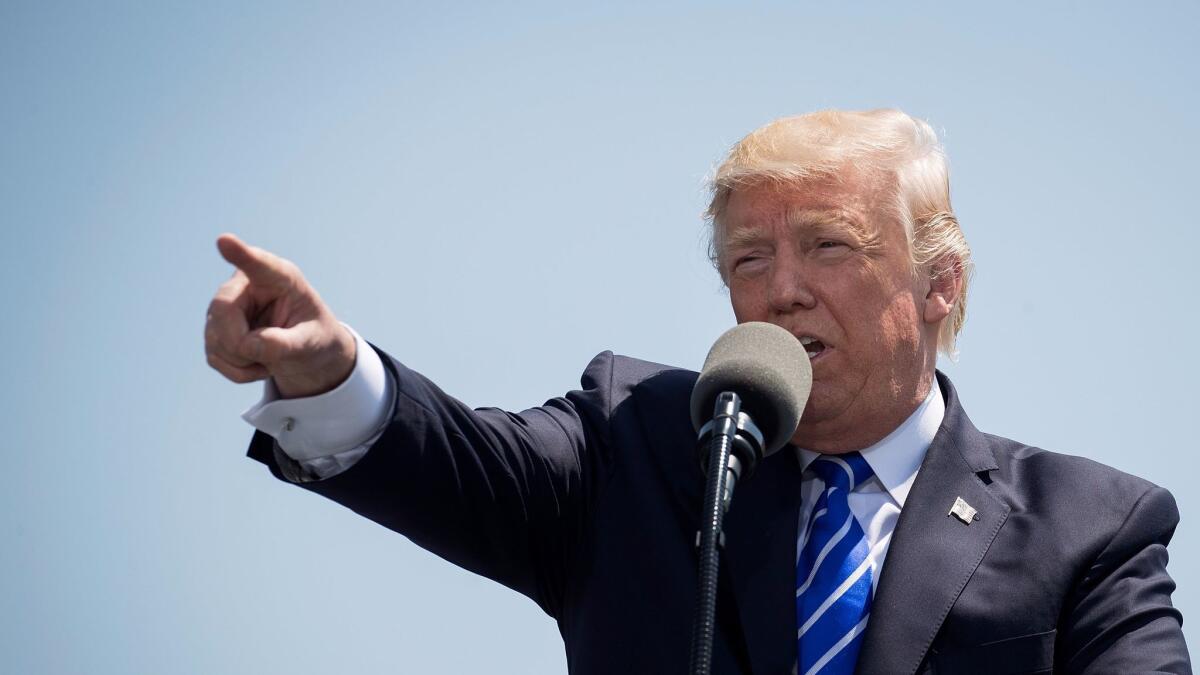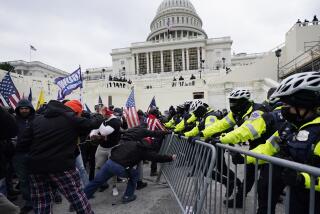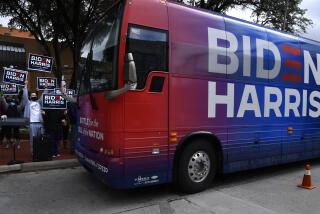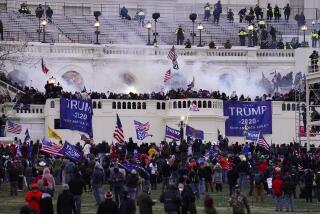Trump’s lawyers claim a free-speech right to urge supporters to use ‘reasonable force’ to kick out protesters

- Share via
Reporting from WASHINGTON — Lawyers for President Trump say he had a 1st Amendment right to urge his supporters to eject “disruptive protesters” from his campaign rallies, including the “right to use reasonable force” to remove those who are not welcome.
The legal claim came in an emergency motion asking a U.S. appeals court in Ohio to throw out a lawsuit filed by three people who said they were roughed up at a Trump rally in Louisville, Ky., in March of last year. A lower court judge declined to do so.
That district court judge said the plaintiffs’ lawsuit “described a chaotic and violent scene in which a crowd of people turned on three individuals” who were shoved, punched and cursed by Trump’s supporters.
At issue now is whether Trump can be held liable for having provoked violence against the protesters. They sued Trump and the Trump campaign, seeking damages for what they alleged was a reckless incitement to violence.
In their new motion, Trump’s lawyers said protesters who “initially purchased tickets and entered the rally in a peaceful manner” may be forcibly removed if they were disruptive.
“It also makes no difference whether the crowd reacted with unlawful violence beyond what Mr. Trump advocated, because the hostile reaction of the crowd does not not transform protected speech into incitement,” they said.
In late March, U.S. District Judge David Hale refused to dismiss the lawsuit brought by two women and one man who said they were forced by Trump’s supporters to leave the rally. One of the plaintiffs, an African American woman, had held up a “sign depicting Trump’s face on the body of pig,” the lawyers said.
“Trump kept saying, ‘Get them out, get them out,’ and people in the crowd began pushing and shoving the protesters,” said Alvin Bamberger, one of the audience members who were cited in the lawsuit. The plaintiffs called him the “most aggressive.”
The president’s lawyers noted in his defense that Trump also said: “Don’t hurt ’em. If I say, ‘Go get ’em,’ I get in trouble with the press, the most dishonest human beings in the world.”
Another of the plaintiffs, a 17-year-old high school student, said he was punched in the stomach by a member of the Traditionalist Worker Party, which was described as a white nationalist group.
Judge Hale did not say the plaintiffs should win the case, but said their complaint was sufficient to proceed toward a trial. “It is plausible that Trump’s directive to ‘get ’em out of here’ advocated the use of force. [It] is stated in the imperative; it was an order, an instruction, a command,” he wrote in his March 31 order.
This week, Trump’s lawyers filed a “writ of mandamus” with the U.S. 6th Circuit Court asking the appeals court to remove the case from Hale. They argued Trump cannot be held liable for “negligently inspiring third parties to engage in violence.”
“Without this court’s intervention, this litigation will inflict irreparable harm on the Trump defendants by subjecting them to punitive litigation as the price of exercising their core First Amendment rights,” Washington attorney Michael Carvin wrote.
“Mr. Trump had a First Amendment right to call for the removal of disruptive protesters from his campaign rally, and it is a bedrock principle of law that the right to exclude another … includes the right to use reasonable force,” he said.
The Supreme Court in its most famous ruling on the issue of violence and free speech said the 1st Amendment shields speakers, except when their words are “likely to incite … imminent lawless action.” In that 1969 case, Brandenburg vs. Ohio, the court overturned the conviction of a Ku Klux Klan leader who said at a rally that there may be violence if “our president, our Congress, our Supreme Court continues to suppress the white, Caucasian race.”
On Twitter: DavidGSavage
More to Read
Get the L.A. Times Politics newsletter
Deeply reported insights into legislation, politics and policy from Sacramento, Washington and beyond. In your inbox three times per week.
You may occasionally receive promotional content from the Los Angeles Times.











